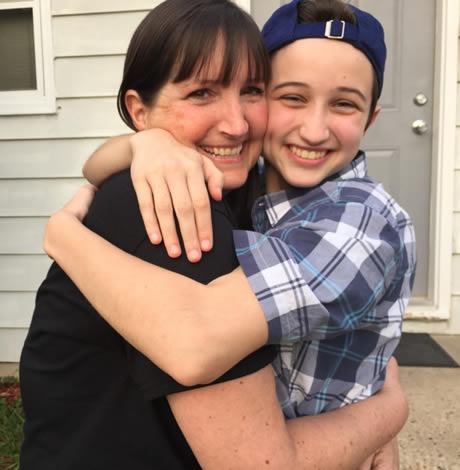National
In first, fed’l appeals court rules anti-gay bias barred under current law
Panel finds sexual orientation bias barred under Title VII


For the first tine, a federal appeals court has ruled anti-gay bias is illegal under current law.
For the first time, a federal appeals court has determined discrimination based on sexual orientation amounts to sex discrimination and is unlawful under current civil rights law.
In a 69-page decision, the U.S. 7th Circuit Court of Appeals in Chicago ruled Tuesday in the case of Hively v. Ivy Tech Community College anti-gay workplace bias is unlawful under Title VII of the Civil Rights Act of 1964, reversing an earlier decision from a three-judge panel finding precedent precludes the court from making that determination.
Writing for the majority in the 8-3 decision, U.S. Chief Judge Diane Wood, a Clinton appointee, finds discrimination based on sexual orientation constitutes discrimination based on one’s perception of gender stereotypes, which the U.S. Supreme Court has determined is unlawful under Title VII.
“Any discomfort, disapproval, or job decision based on the fact that the complainant—woman or man— dresses differently, speaks differently, or dates or marries a same-sex partner, is a reaction purely and simply based on sex,” Wood writes. “That means that it falls within Title VII’s prohibition against sex discrimination, if it affects employment in one of the specified ways.”
Wood also relies heavily on the reasoning in the 1967 U.S. Supreme Court decision in the case of Loving v. Virginia, which struck down bans on interracial marriage and served as a basis for the court’s ruling in favor of marriage equality in 2015.
“Changing the race of one partner made a difference in determining the legality of the conduct, and so the law rested on distinctions drawn according to race, which were unjustifiable and racially discriminatory,” Wood writes. “So too, here. If we were to change the sex of one partner in a lesbian relationship, the outcome would be different. This reveals that the discrimination rests on distinctions drawn according to sex.”
Wood cautions the ruling “decided only the issue put before us” and not, for example, whether Ivy Tech is a religious institution and therefore entitled to the religious exemption under Title VII, nor the legality of anti-gay discrimination “in the context of the provision of social or public services.”
“We hold only that a person who alleges that she experienced employment dis- crimination on the basis of her sexual orientation has put forth a case of sex discrimination for Title VII purposes,” Wood concludes. “It was therefore wrong to dismiss Hively’s complaint for failure to state a claim.”
In a new trend, a number of district courts have begun to rule anti-gay discrimination violates federal laws against sex discrimination, but federal appeals courts — including the 11th Circuit and the 2nd Circuit — had continued to reject that interpretation of Title VII until now. The 7th Circuit ruling marks the first time a federal court has reached that conclusion after decades of gay, lesbian and bisexual plaintiffs filing complaints before federal courts under that law.
The ruling reverses and remands the lower court ruling in the case, which was filed in 2014 by Kimberly Hively against her former employer, the Indiana-based Ivy Tech Community College, where she worked as a part-time professor. The lawsuit alleged the school violated Title VII of the Civil Rights Act of 1964 by denying Hively full-time employment and promotions because she’s a lesbian.
Echoing Wood in a concurring decision is U.S. Circuit Judge Richard Posner, who was responsible for the 7th Circuit’s decision in favor of marriage equality in 2015 and opined in this case changing attitudes toward sex and gender call for a new interpretation of Title VII.
“The position of a woman discriminated against on account of being a lesbian is thus analogous to a woman’s being discriminated against on account of being a woman,” Posner writes. “That woman didn’t choose to be a woman; the lesbian didn’t choose to be a lesbian. I don’t see why firing a lesbian because she is in the subset of women who are lesbian should be thought any less a form of sex discrimination than firing a woman because she’s a woman.”
But Posner cautioned against basing the decision on Supreme Court precedent prohibiting gender stereotyping in Oncale, which he wrote is “rather evasive,” or Loving, which he said was a constitutional case based on race and “had nothing to do with the recently enacted Title VII.”
Despite criticism of the judiciary for allegedly interpreting the law in ways inconsistent with the intentions of Congress, Posner writes that’s not a problem because he says courts do it “fairly frequently to avoid statutory obsolescence and concomitantly to avoid placing the entire burden of updating old statutes on the legislative branch.”
Also writing a concurring opinion was U.S. Circuit Judge Joel Flaum, a Reagan-appointed judge who writes that sexual orientation discrimination constitutes sex discrimination under Title VII without any need to reinterpret the law.
“So if discriminating against an employee because she is homosexual is equivalent to discriminating against her because she is (A) a woman who is (B) sexually attracted to women, then it is motivated, in part, by an enumerated trait: The employee’s sex,” Flaum writes. “That is all an employee must show to successfully allege a Title VII claim.”
Writing the dissent in the case was U.S. Circuit Judge Diane Sykes, a George W. Bush-appointed judge who writes the majority “deploys a judge-empowering, common-law decision method that leaves a great deal of room for judicial discretion.”
“Respect for the constraints imposed on the judiciary by a system of written law must begin with fidelity to the traditional first principle of statutory interpretation: When a statute supplies the rule of decision, our role is to give effect to the enacted text, interpreting the statutory language as a reasonable person would have understood it at the time of enactment,” Sykes writes. “We are not authorized to infuse the text with a new or unconventional meaning or to update it to respond to changed social, economic, or political conditions.”
Sykes was on the list of judges from which President Trump said during his campaign he’d make appointments to the U.S. Supreme Court and reportedly was one of the three picks on the short list for the late U.S. Associate Justice Antonin Scalia’s seat before Trump nominated U.S. Circuit Judge Neil Gorsuch.
The decision was a source of joy for LGBT rights supporters, who for decades have made a priority of protecting LGBT workers from discrimination.
Greg Nevins, employment fairness program director for Lambda Legal and attorney for the plaintiff, said in a statement the decision is a “gamechanger” for gay people facing workplace discrimination and “sends a clear message to employers: It is against the law to discriminate on the basis of sexual orientation.”
“In many cities and states across the country, lesbian and gay workers are being fired because of who they love,” Nevins said. “But, with this decision, federal law is catching up to public opinion: ninety-percent of Americans already believe that LGBT employees should be valued for how well they do their jobs—not who they love or who they are. Now, through this case and others, that principle is backed up by the courts.”
The U.S. Equal Employment Opportunity Commission, the U.S. agency charged with enforcing federal employment civil rights law, determined in its 2015 decision in the case of Baldwin v. Foxx that discrimination against workers for being gay, lesbian or bisexual violates Title VII.
Chad Feldblum, a lesbian and commissioner of the EEOC, said in reaction to the Hively ruling she hopes the decision will serve as model for outside the 7th Circuit in sexual-orientation discrimination cases.
“I am gratified to see that the Seventh Circuit has adopted the simple logic that sexual orientation discrimination is a form of sex discrimination and I hope its reasoning can serve as a model for other courts,” Feldblum said.
The 7th Circuit is composed of Wisconsin, Illinois and Indiana. Wisconsin and Illinois already had state laws against sexual-orientation discrimination in employment, but the ruling assures for the first-time gay, lesbian and bisexual workers have recourse if they face discrimination in Indiana.
Shannon Minter, legal director for the National Center for Lesbian Rights, said the decision “opens the door to a new era for LGBTQ plaintiffs under federal sex discrimination law.”
“With this historic decision, the 7th Circuit is the first federal appellate court to acknowledge that discrimination because a person is gay, lesbian or bisexual can only reasonably be understood as discrimination based on sex,” Minter said. “The court deserves credit for rejecting the tortured rationales of older decisions and undertaking a principled analysis, based on the Supreme Court’s affirmation in Price Waterhouse and other cases, that Title VII of the Civil Rights Act of 1964 must be broadly construed to prohibit the full range of sex-based discrimination.”
Although Ivy Tech Community College could file a petition for certiorari to urge the U.S. Supreme Court to reverse the 7th Circuit decision, the school has indicated it won’t pursue that route.
“Ivy Tech Community College rejects discrimination of all types, sexual-orientation discrimination is specifically barred by our policies,” said Jeff Fanter, an Ivy Tech spokesperson. “Ivy Tech respects and appreciates the opinions rendered by the judges of the Seventh Circuit Court of Appeals and does not intend to seek Supreme Court review. The college denies that it discriminated against the plaintiff on the basis of her sex or sexual orientation and will defend the plaintiff’s claims on the merits in the trial court.”
With the 7th Circuit decision, workplace protections for gay, lesbian and bisexual people are catching up to those of transgender people. For years, federal appeals courts have determined discrimination against workers for being transgender amounts to sex discrimination under Title VII, but haven’t done so for sexual orientation discrimination. In 2012, the U.S. EEOC affirmed anti-trans discrimination is unlawful under Title VII in the case of Macy v. Holder.
Pennsylvania
Malcolm Kenyatta could become the first LGBTQ statewide elected official in Pa.
State lawmaker a prominent Biden-Harris 2024 reelection campaign surrogate

Following his win in the Democratic primary contest on Wednesday, Pennsylvania state Rep. Malcolm Kenyatta, who is running for auditor general, is positioned to potentially become the first openly LGBTQ elected official serving the commonwealth.
In a statement celebrating his victory, LGBTQ+ Victory Fund President Annise Parker said, “Pennsylvanians trust Malcolm Kenyatta to be their watchdog as auditor general because that’s exactly what he’s been as a legislator.”
“LGBTQ+ Victory Fund is all in for Malcolm, because we know he has the experience to win this race and carry on his fight for students, seniors and workers as Pennsylvania’s auditor general,” she said.
Parker added, “LGBTQ+ Americans are severely underrepresented in public office and the numbers are even worse for Black LGBTQ+ representation. I look forward to doing everything I can to mobilize LGBTQ+ Pennsylvanians and our allies to get out and vote for Malcolm this November so we can make history.”
In April 2023, Kenyatta was appointed by the White House to serve as director of the Presidential Advisory Commission on Advancing Educational Equity, Excellence and Economic Opportunity for Black Americans.
He has been an active surrogate in the Biden-Harris 2024 reelection campaign.
The White House
White House debuts action plan targeting pollutants in drinking water
Same-sex couples face higher risk from environmental hazards

Headlining an Earth Day event in Northern Virginia’s Prince William Forest on Monday, President Joe Biden announced the disbursement of $7 billion in new grants for solar projects and warned of his Republican opponent’s plans to roll back the progress his administration has made toward addressing the harms of climate change.
The administration has led more than 500 programs geared toward communities most impacted by health and safety hazards like pollution and extreme weather events.
In a statement to the Washington Blade on Wednesday, Brenda Mallory, chair of the White House Council on Environmental Quality, said, “President Biden is leading the most ambitious climate, conservation, and environmental justice agenda in history — and that means working toward a future where all people can breathe clean air, drink clean water, and live in a healthy community.”
“This Earth Week, the Biden-Harris Administration announced $7 billion in solar energy projects for over 900,000 households in disadvantaged communities while creating hundreds of thousands of clean energy jobs, which are being made more accessible by the American Climate Corps,” she said. “President Biden is delivering on his promise to help protect all communities from the impacts of climate change — including the LGBTQI+ community — and that we leave no community behind as we build an equitable and inclusive clean energy economy for all.”
Recent milestones in the administration’s climate policies include the U.S. Environmental Protection Agency’s issuance on April 10 of legally enforceable standard for detecting and treating drinking water contaminated with polyfluoroalkyl substances.
“This rule sets health safeguards and will require public water systems to monitor and reduce the levels of PFAS in our nation’s drinking water, and notify the public of any exceedances of those levels,” according to a White House fact sheet. “The rule sets drinking water limits for five individual PFAS, including the most frequently found PFOA and PFOS.”
The move is expected to protect 100 million Americans from exposure to the “forever chemicals,” which have been linked to severe health problems including cancers, liver and heart damage, and developmental impacts in children.
An interactive dashboard from the United States Geological Survey shows the concentrations of polyfluoroalkyl substances in tapwater are highest in urban areas with dense populations, including cities like New York and Los Angeles.
During Biden’s tenure, the federal government has launched more than 500 programs that are geared toward investing in the communities most impacted by climate change, whether the harms may arise from chemical pollutants, extreme weather events, or other causes.
New research by the Williams Institute at the UCLA School of Law found that because LGBTQ Americans are likelier to live in coastal areas and densely populated cities, households with same-sex couples are likelier to experience the adverse effects of climate change.
The report notes that previous research, including a study that used “national Census data on same-sex households by census tract combined with data on hazardous air pollutants (HAPs) from the National Air Toxics Assessment” to model “the relationship between same-sex households and risk of cancer and respiratory illness” found “that higher prevalence of same-sex households is associated with higher risks for these diseases.”
“Climate change action plans at federal, state, and local levels, including disaster preparedness, response, and recovery plans, must be inclusive and address the specific needs and vulnerabilities facing LGBT people,” the Williams Institute wrote.
With respect to polyfluoroalkyl substances, the EPA’s adoption of new standards follows other federal actions undertaken during the Biden-Harris administration to protect firefighters and healthcare workers, test for and clean up pollution, and phase out or reduce use of the chemicals in fire suppressants, food packaging, and federal procurement.
Maine
Maine governor signs transgender, abortion sanctuary bill into law
Bomb threats made against lawmakers before measure’s passage

BY ERIN REED | On Tuesday, Maine Gov. Janet Mills signed LD 227, a sanctuary bill that protects transgender and abortion providers and patients from out-of-state prosecution, into law.
With this action, Maine becomes the 16th state to explicitly protect trans and abortion care in state law from prosecution. This follows several bomb threats targeting state legislators after social media attacks from far-right anti-trans influencers such as Riley Gaines and Chaya Raichik of Libs of TikTok.
An earlier version of the bill failed in committee after similar attacks in January. Undeterred, Democrats reconvened and added additional protections to the bill before it was passed into law.
The law is extensive. It asserts that gender-affirming care and reproductive health care are “legal rights” in Maine. It states that criminal and civil actions against providers and patients are not enforceable if the provision or access to that care occurred within Maine’s borders, asserting jurisdiction over those matters.
It bars cooperation with out-of-state subpoenas and arrest warrants for gender-affirming care and abortion that happen within the state. It even protects doctors who provide gender-affirming care and abortion from certain adverse actions by medical boards, malpractice insurance, and other regulating entities, shielding those providers from attempts to economically harm them through out-of-state legislation designed to dissuade them from providing care.
You can see the findings section of the bill here:
The bill also explicitly enshrines the World Professional Association of Transgender Health’s Standards of Care, which have been the target of right-wing disinformation campaigns, into state law for the coverage of trans healthcare:
The bill is said to be necessary due to attempts to prosecute doctors and seek information from patients across state lines. In recent months, attorneys general in other states have attempted to obtain health care data on trans patients who traveled to obtain care. According to the U.S. Senate Finance Committee, attorneys general in Tennessee, Indiana, Missouri, and Texas attempted to obtain detailed medical records “to terrorize transgender teens in their states … opening the door to criminalizing women’s private reproductive health care choices.”
The most blatant of these attempts was from the attorney general of Texas, who, according to the Senate Finance Committee, “sent demands to at least two non-Texas entities.” One of these entities was Seattle Children’s Hospital, which received a letter threatening administrators with arrest unless they sent data on Texas patients traveling to Seattle to obtain gender-affirming care.
Seattle Children’s Hospital settled that case out of court this week, agreeing to withdraw its Texas business registration in return for Texas dropping its investigation. This likely will have no impact on Seattle Children’s Hospital, which has stated it did not treat any youth via telemedicine or in person in Texas; the hospital will be able to continue treating Texas youth who travel outside of Texas to obtain their care. That settlement was likely compelling due to a nearly identical law in Washington that barred out-of-state investigations on trans care obtained solely in the state of Washington.
The bill has faced a rocky road to passage. A similar bill was debated in January, but after coming under intense attack from anti-trans activists who misleadingly called it a “transgender trafficking bill,” the bill was voluntarily withdrawn by its sponsor.
When LD 227 was introduced, it faced even more attacks from Gaines and Libs of TikTok. These attacks were followed by bomb threats that forced the evacuation of the legislature, promising “death to pedophiles” and stating that a bomb would detonate within a few hours in the capitol building.
Despite these threats, legislators strengthened both the abortion and gender-affirming care provisions and pressed forward, passing the bill into law. Provisions found in the new bill include protecting people who “aid and assist” gender-affirming care and abortion, protections against court orders from other states for care obtained in Maine, and even protections against adverse actions by health insurance and malpractice insurance providers, which have been recent targets of out-of-state legislation aimed at financially discouraging doctors from providing gender-affirming care and abortion care even in states where it is legal.
See a few of the extensive health insurance and malpractice provisions here:
Speaking about the bill, Gia Drew, executive director of Equality Maine, said in a statement, “We are thrilled to see LD 227, the shield bill, be signed into law by Gov. Mills. Thanks to our pro equality and pro reproductive choice elected officials who refused to back down in the face of disinformation. This bill couldn’t come into effect at a better time, as more than 40 percent of states across the country have either banned or attempted to block access to reproductive care, which includes abortions, as well as transgender healthcare for minors. Thanks to our coalition partners who worked tirelessly to phone bank, lobby, and get this bill over the finish line to protect community health.”
Destie Hohman Sprague of the Maine Women’s Lobby celebrated the passage of the bill despite threats of violence, saying in a statement, “A gender-just Maine ensures that all Mainers have access to quality health care that supports their mental and physical wellbeing and bodily autonomy, including comprehensive reproductive and gender-affirming care. We celebrate the passage of LD 227, which helps us meet that goal. Still, the patterns of violence and disinformation ahead of the vote reflected the growing connections between misogyny, extremism, and anti-democratic threats and actions. We must continue to advocate for policies that protect bodily autonomy, and push back against extremist rhetoric that threatens our states’ rights and our citizens’ freedoms.”
The decision to pass the legislation comes as the Biden administration released updated HIPAA protections that protect “reproductive health care” from out-of-state prosecutions and investigations.
Although the definition of “reproductive health care” is broad in the new HIPAA regulations, it is uncertain whether they will include gender-affirming care. For at least 16 states, though, gender-affirming care is now explicitly protected by state law and shielded from out-of-state legislation, providing trans people and those seeking abortions with protections as the fight increasingly crosses state lines.
****************************************************************************

Erin Reed is a transgender woman (she/her pronouns) and researcher who tracks anti-LGBTQ+ legislation around the world and helps people become better advocates for their queer family, friends, colleagues, and community. Reed also is a social media consultant and public speaker.
******************************************************************************************
The preceding article was first published at Erin In The Morning and is republished with permission.
-

 State Department2 days ago
State Department2 days agoState Department releases annual human rights report
-

 Maryland4 days ago
Maryland4 days agoJoe Vogel campaign holds ‘Big Gay Canvass Kickoff’
-

 Politics3 days ago
Politics3 days agoSmithsonian staff concerned about future of LGBTQ programming amid GOP scrutiny
-

 The White House24 hours ago
The White House24 hours agoWhite House debuts action plan targeting pollutants in drinking water











